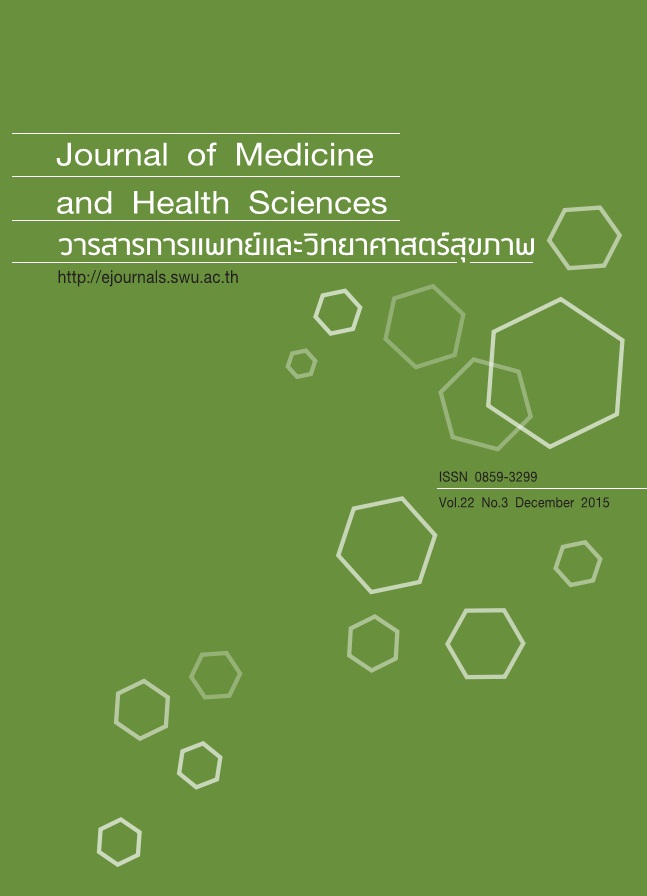Effect of monoolein on inhibition of tumor growth in cervical cancer xenografts in nude mice
Keywords:
โมโนโอเลอีน, เซลล์มะเร็งปากมดลูก, การโตของก้อนเนื้องอกมะเร็ง, การศึกษาในสัตว์ทดลอง, การปลูกถ่ายเซลล์มะเร็งในหนูนูดไมซ์, monoolein, HeLa cell, tumor growth, in vivo study, xenograft nude mice modelAbstract
Monoolein (MO), a glycolipid biosurfactant purified from Exophiala dermatitidis fungus culture broth was previously demonstrated anti-proliferative activity against cervical cancer cell line. We investigated the effect of monoolein on the implanted tumor growth in nude mice. The cytotoxicity test of monoolein on HeLa cells proliferation was examined by using the 3-(4,5-Dimethylthiazol-2-yl)-2,5-Diphenyltetrazolium Bromide assay (MTT assay). For in vivo study, HeLa cells were implanted subcutaneously into the dorsal of BALB/c-nude mice to form xenograft tumors. Mice were divided into 3 groups; control mice were treated with MO, tumor-bearing mice treated and untreated (HeLa-MO and HeLa-Vehicle group, respectively). The administration of MO was performed by injecting with 200 mg/kg BW/day whereas HeLa-Vehicle group was injected with 0.05% ethanol once daily for 30 days respectively. Tumor size was measured every two days and tumor volume was calculated. Histopathological examination by hematoxyline and eosin staining was performed. The results showed that the proliferation of cultured HeLa cells were significantly inhibited by MO in a dose-dependent manner. The half maximal inhibitory concentration (IC50) was 34.87 ± 1.13 µg/ml. Importantly, MO showed significantly lower tumor development in HeLa-MO group than that in the HeLa-Vehicle group. The histopathological analysis showed that the MO treatment significantly reduced the mitotic figure in HeLa-MO group compared with HeLa-Vehicle group (p<0.001). In conclusion, the present study demonstrated that monoolein significantly suppressed the HeLa cell xenograft tumor growth in nude mice model.
ผลของโมโนโอเลอีนต่อการยับยั้งการเจริญ ของก้อนเนื้องอกมะเร็งในหนูนูดไมซ์ ที่ได้รับการปลูกถ่ายด้วยเซลล์มะเร็งปากมดลูก
โมโนโอเลอีน (monoolein) เป็นสารลดแรงตึงผิวที่สกัดได้จากเชื้อรา E. dermatitidis ในการศึกษาที่ผ่านมาพบว่า มีประสิทธิภาพในการยับยั้งการเพิ่มจำนวนของเซลล์มะเร็งปากมดลูกและเซลล์มะเร็งเม็ดเลือดขาว การศึกษาครั้งนี้มี วัตถุประสงค์เพื่อศึกษาฤทธิ์ของโมโนโอเลอีนต่อการยับยั้งการเจริญของเซลล์มะเร็งปากมดลูก (HeLa cell) ในรูปแบบของ in vitro และ in vivo study โดยทดสอบด้วยวิธี3-(4,5-Dimethylthiazol-2-yl)-2,5-Diphenyltetrazolium Bromide assay (MTT assay) และการปลูกถ่ายเซลล์มะเร็งปากมดลูกเข้าใต้ผิวหนังของหนูนูดไมซ์ตามลำดับ สำหรับการศึกษาใน สัตว์ทดลอง ได้แบ่งหนูออกเป็น 3 กลุ่ม คือ กลุ่มหนูปกติที่ได้รับโมโนโอเลอีน (กลุ่ม control) กลุ่มหนูมะเร็งที่ได้รับ โมโนโอเลอีน (HeLa-MO) และไม่ได้รับโมโนโอเลอีน (HeLa-Vehicle) หลังจากการปลูกถ่ายเซลล์มะเร็งแล้ว 3 สัปดาห์ สารโมโนโอเลอีนขนาด 200 มก./กก. น้ำหนักตัวหนูจะถูกฉีดเข้ารอบๆ ก้อนเนื้องอกทุกวัน (กลุ่ม HeLa-MO) เป็นเวลา 28 วัน และวัดขนาดของก้อนเนื้องอกด้วย micro-caliper วันเว้นวัน เพื่อคำนวณขนาดของก้อนเนื้องอก เมื่อสิ้นสุดการ ศึกษาก้อนเนื้อมะเร็งจะถูกตัดและชั่งน้ำหนัก และนำมาศึกษาทางพยาธิวิทยาด้วยการย้อม Hematoxyline & Eosin จาก ผลการศึกษา สารโมโนโอเลอีนมีความเป็นพิษต่อเซลล์มะเร็ง HeLa โดยมีค่า IC50 เท่ากับ 34.87±1.13 มก./มล. ที่น่าสนใจ โมโนโอเลอีนความเข้มข้น 200 มก./กก. น้ำหนักตัวหนูสามารถชะลอการโตของก้อนเนื้องอกและมีอัตราการยับยั้งการเจริญ คิดเป็นร้อยละ 59.20±0.05 อีกทั้งการศึกษาทางพยาธิวิทยาแสดงให้เห็นว่าสารโมโนโอเลอีนลดการเจริญของเซลล์ มะเร็งปากมดลูกอย่างมีนัยสำคัญทางสถิติ(p<0.001) เมื่อเปรียบเทียบกับหนูกลุ่มมะเร็งที่ไม่ได้รับสารโมโนโอเลอีน ผลการศึกษาสรุปได้ว่าสารโมโนโอเลอีนมีพิษต่อเซลล์มะเร็งปากมดลูก และยังสามารถชะลอการโตของก้อนมะเร็งที่เกิด จากการปลูกถ่ายเซลล์มะเร็งปากมดลูกในหนูทดลองได้



